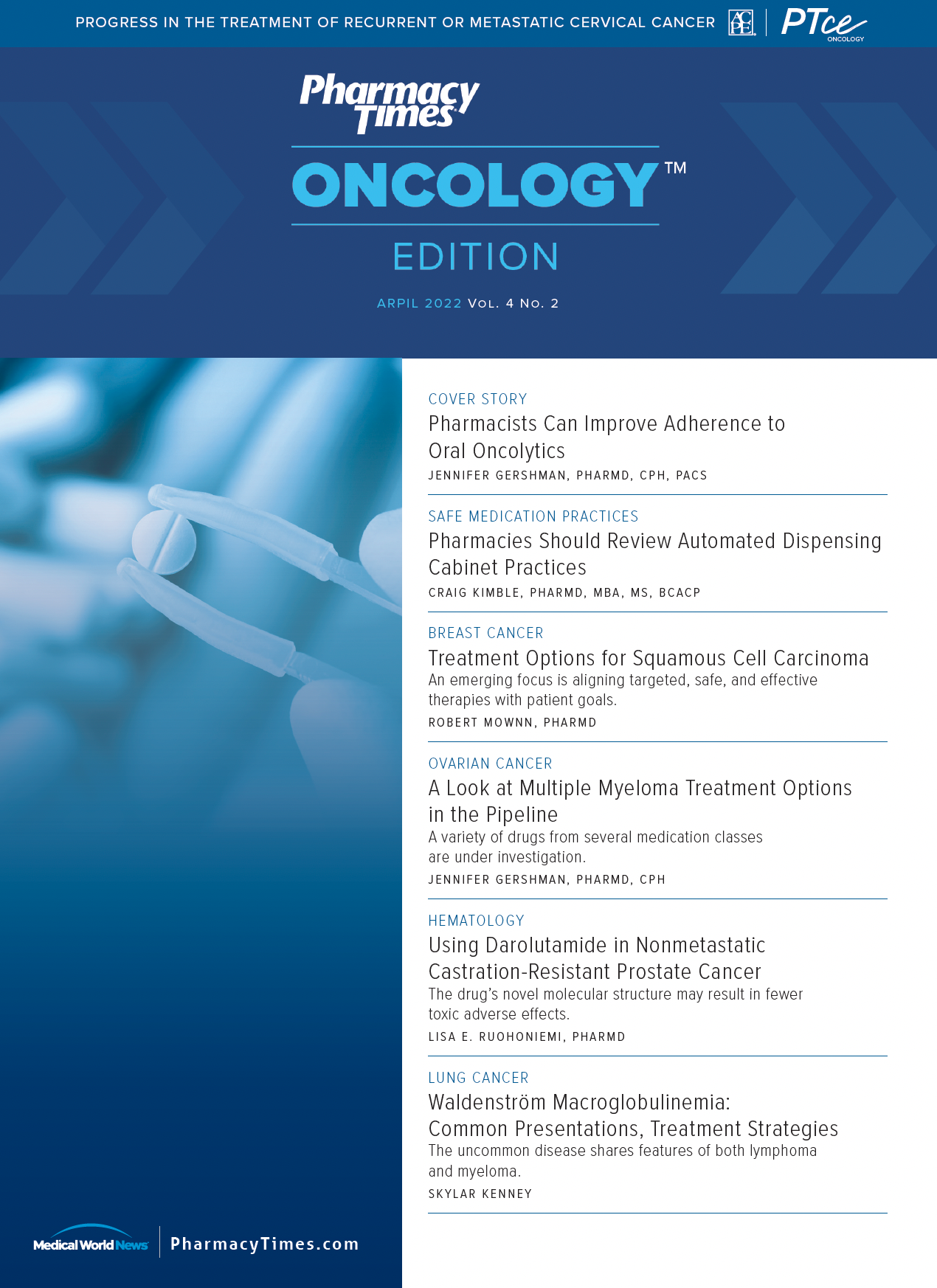Publication
Article
Pharmacy Practice in Focus: Oncology
Supporting Oral Oncolytics in Follicular and Marginal Zone Lymphomas
In a live virtual symposium at the 2021 ASHP Midyear Clinical Meeting, 2 experts teamed up to highlight the place in therapy and management of oral oncolytics in follicular and marginal zone lymphoma.
In a live virtual symposium at the 2021 ASHP Midyear Clinical Meeting, 2 experts teamed up to highlight the place in therapy and management of oral oncolytics in follicular and marginal zone lymphoma in a presentation titled Optimizing Patient Care in Follicular and Marginal Zone Lymphomas Through Pharmacist Interventions.
Bernard Marini, PharmD, BCOP, began the presentation with an illustration of factors that impact the choice of treatment in follicular lymphoma (FL) including age, comorbidities, prognosis, patient preferences, and disease characteristics. Patients with localized disease may be managed with radiation with or without rituximab or chemotherapy. He noted that some patients with disseminated FL are observed, and others may receive rituximab monotherapy or in combination with lenalidomide or chemotherapy. Dr Marini explained that, apart from lenalidomide, oral therapies are reserved for later lines of treatment. Duvelisib, idelalisib, umbralisib, and tazemetostat are incorporated in third-line or subsequent therapy of FL. He wrapped up the session by providing clinical pearls on management of colitis, hepatitis, pneumonitis, opportunistic infections, cytopenias, and cutaneous reactions observed with PI3K inhibitors.
Karen M. Fancher, PharmD, BCOP, kicked off the second portion of the program with an overview of first-line treatment for MZL and noted oral therapies come into play for second-line and subsequent regimens. Ibrutinib and lenalidomide plus rituximab are preferred second-line regimens in the National Comprehensive Cancer Network Clinical Practice Guidelines for MZL. Umbralisib may be considered for patients who are relapsed/refractory after at least 1 prior anti-CD20-monoclonal antibody-based regimen and duvelisib and idelalisib are oral options for patients with relapsed or refractory MZL after 2 prior therapies.
After a deep dive into the data, Dr Fancher pivoted to discuss adherence to oral oncolytic therapies. She illustrated 2 different trials in patients with chronic lymphocytic leukemia that have linked nonadherence to ibrutinib with a significant decrease in progression-free survival. Dr Fancher described multiple barriers to adherence to oral oncolytic therapy where pharmacists can make a positive impact: (1) management of adverse effects; (2) mitigating financial toxicity; (3) improving access to medications; (4) medication education; (5) reducing prescription burden; and (6) improving perception of consequences from nonadherence, low health literacy, and perceived benefit.
These are key points that Dr Fancher recommended to include in patient education:
- Treatment decision
- Medication administration
- Adverse effects
- Monitoring plan
- Safe handling
- Medication access
In the final portion of her presentation, Dr Fancher reviewed best practices for pharmacist involvement in monitoring oral oncolytic therapy. Oncology pharmacists who are part of the interdisciplinary team should use collaborative practice agreements for both laboratory and symptom monitoring and to assess adherence 7 to 14 days after the start of treatment, at each clinical encounter, and before every refill.
Bernard Marini, PharmD, BCOP, called for pharmacists to support “Early recognition of and intervention for PI3K inhibito adverse effects, which is essential for keeping patients on therapy in order to maintain meaningful disease control."
Karen M. Fancher, PharmD, BCOP, emphasized, “A dedicated medication assistance team should prospectively screen and provide support for oral oncolytic medications.”

Newsletter
Stay informed on drug updates, treatment guidelines, and pharmacy practice trends—subscribe to Pharmacy Times for weekly clinical insights.






